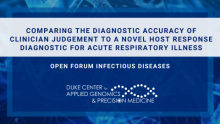
Duke Center for Applied Genomics & Precision Medicine (CAGPM) faculty member, Ephraim Tsalik, MD, PhD, is senior author in a recent publication in Open Forum Infectious Diseases on, “Comparing the Diagnostic Accuracy of Clinician Judgement to a Novel Host Response Diagnostic for Acute Respiratory Illness.” Co-authors from CAGPM include Micah McClain, MD, PhD, Geoffrey Ginsburg, MD, PhD, and Christopher Woods, MD.
Discriminating bacterial and viral infections remains clinically challenging. The resulting antibacterial misuse contributes to the antimicrobial resistance problem. Host gene expression-based tests are a promising strategy to discriminate bacterial and viral etiologies, but their potential clinical utility has not yet been evaluated.
A host gene expression biosignature was measured using qRT-PCR in 582 Emergency Department participants with suspected infection. Based on chart reviews, the team recorded the clinician diagnosis and the clinician-recommended treatment. Host gene expression, clinician diagnosis, clinician-recommended treatment, and procalcitonin levels were compared to clinical adjudication as the reference standard. To estimate clinical impact of this host response strategy, they calculated the change in overall net benefit (∆NB, the difference in net benefit when comparing one diagnostic strategy to a reference) across a range of prevalence estimates while factoring in the clinical significance of false negative and false positive errors.
Gene expression correctly classified either bacterial, viral, or non-infectious illness 74.1% of the time, outperforming clinician-recommended treatment and procalcitonin. Due to a strong sensitivity bias to treat bacterial infections at the expense of diagnostic accuracy and specificity, the clinician diagnosis was overall more accurate than the corresponding treatment plan (75.4% accuracy vs. 72.2%), resulting in inappropriate antibacterial use in 33.3% of cases. The gene expression test had significantly higher average weighted accuracy for the diagnosis of bacterial infection than both procalcitonin and clinician-recommended treatment (79.9% vs. 71.5% and 76.3%, respectively; p < 0.00001). Consequently, host gene expression had greater net benefit in diagnosing bacterial infection than clinician-recommended treatment (∆NB = 6.4%) and procalcitonin (∆NB = 17.4%).
They conclude that host gene expression-based tests to distinguish bacterial and viral infection can facilitate more appropriate treatment, leading to improved patient outcomes and mitigating the antibacterial resistance crisis.